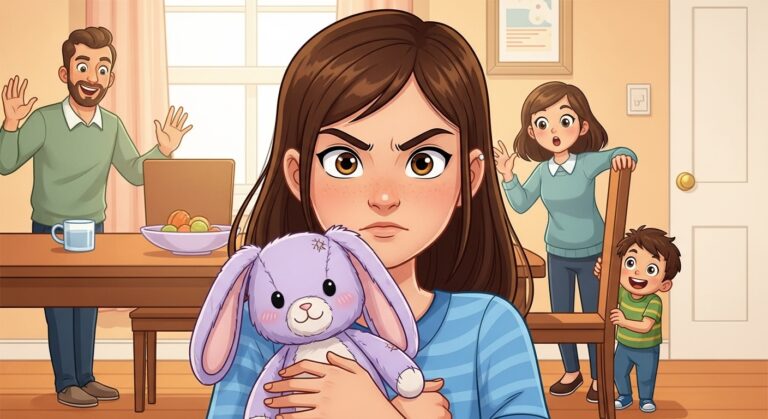Title: The Hidden Heart
In a small suburban town, where the sun rose over meticulously manicured lawns and the scent of fresh coffee wafted through open windows, lived a fifteen-year-old girl named Mia. She was bright, studious, and the apple of her parents’ eye—a fact that often felt more like a gilded cage than a blessing.
Mia’s parents held very high expectations for her. They insisted on a stellar GPA, an impeccable appearance, and, perhaps most importantly, a strict adherence to what they deemed “maturity.” In their eyes, anything deemed “childish” was to be tossed aside like an old newspaper, relegated to the dusty corners of childhood memories. Among these childish things was Mia’s beloved stuffed animal, a soft, lavender bunny named Cuddles.
Cuddles had been a constant companion since Mia was a toddler. They had shared countless adventures, from imaginary quests through enchanted forests to cozy bedtime stories. Even as she grew older, Mia found solace in Cuddles’ comforting presence. With every exam stressed over, every friendship tested, and every tear shed, Cuddles had been there to listen, a silent supporter in a world that often felt overwhelming. So, when Mia’s parents declared that toys were strictly off-limits after the age of ten, she chose to hide Cuddles away instead of letting go.
For years, her secret remained safe, tucked away in the back of her closet, hidden beneath a pile of old clothes. She would take Cuddles out on particularly hard days, seeking comfort in the familiar softness and the memories that came flooding back with each hug. But one fateful day, her younger brother, Oliver, a mischievous eight-year-old with an eye for treasure, stumbled upon Mia’s secret while searching for loose change in her room.
“Hey, what’s this?” Oliver exclaimed, pulling Cuddles from its hiding place. His eyes lit up mischievously, and a sly grin spread across his face. “I won’t tell Mom and Dad if you give me five bucks.”
Mia’s heart sank. The thought of losing Cuddles was unbearable, but she also knew that her parents would be furious if they found out. With a heavy sigh, she reluctantly agreed and handed over the money, hoping to keep her treasured secret safe. However, Oliver, encouraged by the thrill of his discovery, couldn’t resist the temptation of a more significant revelation.
“Guess what I found!” he shouted at the dinner table that evening, his voice bursting with excitement. “Mia has a stuffed animal! She’s still a baby!” The laughter that erupted from their parents felt like daggers to Mia’s heart. She could see the disappointment etched on their faces, the realization that their daughter was still clinging to the remnants of childhood.
What followed was a whirlwind of punishment. Grounded for what felt like an eternity, Mia watched in horror as her parents took Cuddles outside, ready to dispose of the beloved bunny. They doused it with everything from old salad to leftover spaghetti, mocking her attachment to it. “This is what happens when you don’t grow up,” her father said tersely as he tossed Cuddles into the trash bin.
In that moment, a mixture of anger and despair swelled within Mia. As her parents walked away, she felt a fierce determination rise. She could not let them destroy Cuddles, not after everything they had been through together. When the coast was clear, she rushed outside, digging through the garbage, a mixture of sadness and resolve fueling her actions.
Miraculously, she found Cuddles buried beneath the remnants of a meal, stained but still intact. Clutching the bunny to her chest, she retreated back inside, heart racing. She knew her parents would never understand, but she couldn’t let go of the one thing that had always been there for her.
That night, as Mia lay in bed with Cuddles cradled against her, she realized that her attachment was more than just nostalgia. It represented a part of her that her parents would never accept, a part that needed nurturing, not destruction. She understood that she had to find a way to reconcile her love for Cuddles with her parents’ expectations.
The following week, Mia decided to take a stand. Armed with a plan, she approached her parents during dinner. “Can we talk?” she asked, her voice steady despite the anxiety bubbling within her. They exchanged glances, surprised by her tone.
“What is it?” her mother asked, a forkful of vegetables paused midair.
“I know you think I should be more mature, and I want to be. But Cuddles means a lot to me. It’s not just a toy. It’s a reminder of my childhood, of who I am. I’m growing up, but I also want to embrace the parts of me that are still young.”
Her parents listened, their expressions a mix of skepticism and intrigue. Mia explained how Cuddles had been a source of comfort during difficult times, a steadfast friend who had helped her navigate the complexities of life. She emphasized that maturity didn’t mean discarding all remnants of childhood; rather, it was about integrating them into her identity.
After a long silence, her father finally spoke. “We didn’t realize how much it meant to you. But you need to understand that we want what’s best for you. We just want you to be prepared for the world.”
Mia nodded, her heart racing. “I get that. But I promise, having Cuddles doesn’t mean I’m not growing up. It’s part of who I am.”
To her surprise, her parents agreed to let her keep Cuddles, under one condition: that Mia would continue to focus on her studies and her responsibilities. It was a compromise, one that allowed her to embrace her childhood while also striving for maturity.
From that day forward, Mia kept Cuddles in her room, but she also took greater responsibility for her life. She studied harder, engaged more with her family, and discovered that growing up didn’t mean she had to let go of everything she loved. Cuddles became a symbol of balance in her life—a reminder that it’s okay to cherish the past while stepping boldly into the future.
Years later, when Mia looked back on that pivotal moment, she realized that standing up for herself had not only preserved her beloved Cuddles but had also strengthened her relationship with her parents. They learned to appreciate the complexities of growing up, and Mia learned that it was perfectly acceptable to embrace the different parts of herself, no matter how “childish” they seemed.
###





0 Comments